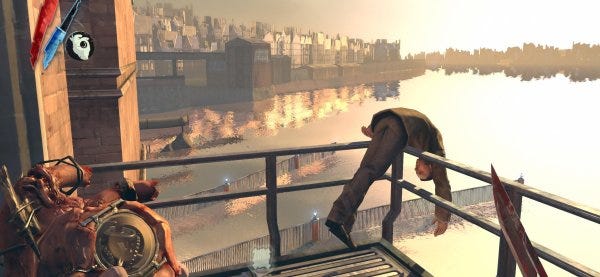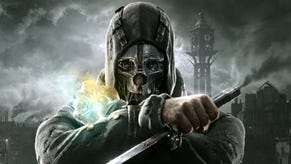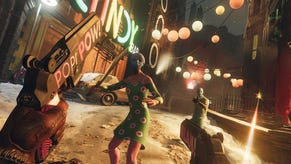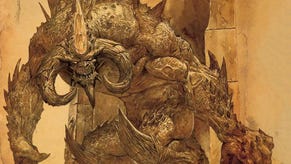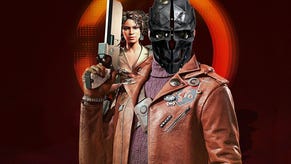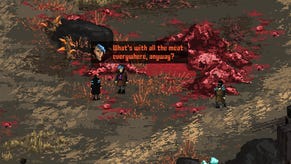Dishonored Dev Joe Houston On Violence In Games
The Man Behind The Neck Stab
Just before Christmas, Nathan wrote a piece asking for a conversation about the role gaming violence plays in our lives. And as so many have when discussing the topic, he featured an image from Dishonored at the top - a man getting stabbed through the neck. For Joe Houston, the former Arkane developer who created that stabbing scene, this was the prompt he needed to give his own perspective on the subject.
Whenever I’m clicking my way through game industry opinion articles, I tend to get hung up on pieces about video game violence. This is mostly because the image plastered across the top of the post is a screen grab from Dishonored. You know, the one where a member of the city watch gets his jugular opened in a first-person blast of arterial spray. But it’s not the shock of that image that stops me. No, I pause because I’m the guy that wrote the code to make the player do that in the first place.
As a member of the core Dishonored team from the beginning, and after slitting virtual throats 2 to 3 times a minute for 3 and a half years, I’m probably the single person most desensitized to the violence in that particular game. And yet that doesn’t mean I can’t find Dishonored’s violence uncomfortable; it just means I need a little additional context beyond the plain old cold steel and choke hold.
For example, after the game’s release I felt just a bit queasy the first time I saw a player go through the party at the Boyle Estate. For those that haven’t played it already, it’s a map filled with nuance and mystery, in which Corvo (the main character) must infiltrate a masquerade ball and discover the identity of his assassination target. This is done by talking to guests, sneaking into forbidden areas, pilfering private journals, and engaging other tactics of subtlety.
Or it’s done by walking in the front door and shooting the first guard you see in the face. This is the approach I first saw a player try without receiving additional prompting. The ensuing battle was chaos, but it was the aftermath that really made it a story worth telling. Following the onslaught, each room of the manor was filled with cowering, begging civilians, their bodyguards all cut down moments before. This is the part of this particular strategy where the player began methodically cutting people down.
Servants and aristocrats, men and women alike. The red splashes of color and truncated screams settled into a steady rhythm, like the grimmest game ever of Dance Dance Revolution. At one point the text “objective completed” flashed across the screen (when the player’s target fell by happenstance), which didn’t even prompt a pause or hesitation in the killing. This player had his own objectives now, spoken by a mad voice in his head: “kill them all, leave no survivors, and then go upstairs and pocket the faberge eggs”.
I laugh when I tell this story because of the sheer absurdity of it. When this was happening and my friend Anthony Huso, level designer for the Boyle Manor, leaned over and whispered “oh man it’s a horror show,” we both chuckled. But there was then (and is now) some discomfort there for me. It’s clearly more than the just the sum of so many beheadings and throat cuttings, especially because the act of cutting someone down in the game is utterly benign to me, solely representing how the animation and code intersect thanks to my old job.
I think the key to my uneasiness is the context of choice here. In this mission more than in any other the player is not only given alternatives to bloodshed, but alternatives that seem like better options to me in every way: sparing lives in this level is more fun, it creates more gameplay, it presents more to see and do, etc. And yet the player is choosing, above all other options, to kill everybody anyway. In this light that string of workmanlike, grim-faced civilian murders is as intentional as is possible in the game, and to me a disquieting conclusion.
As a lifelong gamer and a game developer of the past 8 years, this is an emotional reaction that I really can’t get from a linear game. Acts of game violence are just one form of visual expression to me at this point. If thrust into a game where the choices aren’t mine to make, violence (even horrifying violence) ends up making a statement about what that game’s creators are trying to express more than it makes a statement about me the player being forced into a role.
I especially noticed this a few years ago when I was put into the role of a terrorist shooting civilians in CoD Modern Warfare 2. While I won’t debate that the subject matter was difficult and that it raised some moral questions, playing the game didn’t affect the way I felt about myself or about other people that played that level. The only real choice in the game was whether to continue playing or not (or to skip the section from the menu when prompted). Although something in it certainly challenged or offended people, it did so without their ownership. Even when you played it, it was a violent diorama concocted by someone else.
Now I’m not saying that games must be non-linear to have value. Journey is a good example of a modern game that gives, at best, the illusion of choice. As such, it ends up conveying a directed, precise brushstroke of emotion. And it does so brilliantly. It’s a work of art in that way, the transference of a meticulously crafted experience exactly as it was conceived. However, I do suggest that it’s tough when exploring darker themes, things that a normal person is less likely to admit to. It is harder to create an emotional attachment to wrongdoing if the game lacks the freedom of choice necessary to get the player’s complete buy-in.
So does that mean that linear violent games are better for society than those like Dishonored, those that touch only superficially on violent acts versus those that allow the player to make extreme choices? I argue that linear games that have a lack of personal ownership in game violence actually do so at the disadvantage of society.
I don’t believe that game violence causes real world violence, but I do believe that it does little to prevent it. And games with meaningful (and potentially distasteful) choice just might do better because they stand a chance of making the player think about what they’re doing on screen. And there are others that think so too: Dishonored is one of the few violent video games that has not been censored by the German government. One could argue this is largely because the game can be played without killing anyone. This doesn’t change all the things you might do in the game, but simply by knowing that it allows non-violence you find that every violent act you choose in cast in a sobering light.
Now I’m not saying that Dishonored is a perfect model for all other games. I have referred to the Boyle Estate map because of my personal experience, and because I found that it in particular exemplified a strong emotional reaction to player choice. But Dishonored, and other games like it, are not without moral responsibility. I’ve read criticisms of Dishonored that say it’s a game that “wants to be played a certain way”, often implying that the violent path is the fun one and that the stealthy path is the correct one. I can’t respond to this as that wasn’t my job on the project. However, just the suggestion that such a dichotomy might exist points out the sticky situation developers have to deal with. It implies there is a judgement in the game that may or may not be teaching players strange lessons about violent action. A moral code in a game, oftentimes encoded unintentionally by its designers, is unavoidable. And when a game becomes more effective at evoking emotion (due to player choice), it also gains a higher level of social responsibility. It is a double edged sword, and one that must be wielded with care.
In light of the recent gun violence in the U.S. and the resultant anti-game talk that has stemmed from it, it’s important as gamers not to simply retreat to the easy reaction, that games aren’t a part of the problem. While I think that might be true (after personal examination), I think it’s a pity to stop there. Too often we think about what we might lose as players and developers if forced to engage in that conversation, becoming blinded by the fear of censorship. As a result we miss out on more creative and effective ways to be a part of the solution. As players we can stand to expand our emotional palette by seeking out games that challenge us. And developers have a responsibility to answer that demand with games that engage the player with meaningful choices, additional freedom, and ultimately greater personal responsibility.
Joe was a member of the core Dishonored team and is the founder of Roxlou Games. He is now working on Unwritten, a strategy game about choice for the PC. He also occasionally blogs on an incomprehensible range of topics on his blog.
